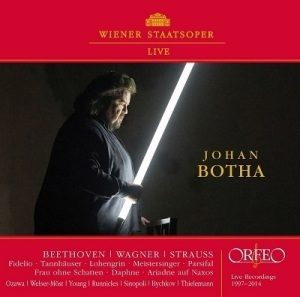Recorded live from 1997-2014 at the Vienna State Opera by the Austrian Radio, this collection of “bleeding chunks” from operas by Beethoven, Wagner, and Strauss starring the late South African tenor, Johan Botha, is most welcome. Botha also sang Italian roles–most notably Verdi’s Otello (but Pinkerton and Cavaradossi as well, in the 1990s)–and this training stood him in good stead as a Wagnerian. His sense of legato was always to be admired and there was none of the struggle or the “Bayreuth bark” to be found in his singing of German roles. He was as admired for his singing in the difficult German repertoire we hear here as he was reviled for his physical and dramatic qualities: he was as portly, or moreso, as Luciano Pavarotti, and he was graceless on stage. He had, however, none of the Italian tenor’s charisma.
That aside–as it should be on an audio-only recording–we find effortless, intelligent singing throughout this CD’s 73 minutes. Working from back to front, the CD ends with the lengthy final scene from Ariadne, which normally finds the tenor–any tenor–stretching and working very hard. Here, joined by the cool Soile Isokoski, Botha’s Bacchus goes from infatuation to confusion to rapture, all in tune, rhythmically accurate and with grand tone.
Second best is Strauss’ Frau, in which Botha sings the Emperor’s first-act monologue with great articulation, pointed text, and wary dynamic range. The scene from Daphne also features tenor Michael Schade as Leukippos, while Botha sings Apollo fearlessly and with abandon. It’s a pleasure to hear the whole Rome Narrative sung with such security and tonal beauty, but one must note that Botha lacks the mania for some of the scene’s more self-lacerating moments. Temperamentally the same might be said about Florestan’s big scene, which begins the CD. Botha lacks the pathos and wildness of say, Jon Vickers, but the singing is splendid, the B-flats easily achieved, and the messa di voce on the opening high-G of “Gott!” is remarkable.
The Bridal Chamber Scene from Lohengrin with Cheryl Studer is youthful, manly, and loving, but it ends abruptly and the effect is lost. Parsifal’s “Wehe! Wehe!” may lack desperation, but who sings it better? And the Prize Song, or at least the section of it when Walther is presenting it to Sachs, is glorious, bright-toned, and caressing–but why not the “winning” version?
In short, this is a fine representation of an artist with a great voice whose performances were not always fully appreciated due to a lack of acting ability and an awkward physical presence. The Vienna State Opera Orchestra plays superbly and one can forgive the fade-outs the recording engineers have opted for.
































